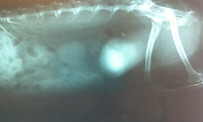Urinary Tract Infection and Stones
Urinary Tract Infections(U.T.I.s) are also fairly common in rabbits. They are usually easy to treat, but can be recurring.
Symptoms you may notice: When a rabbit has a bladder infection, you may see them urinating more often or straining in their litter box. You may actually hear them cry. U.T.I.s are very painful. They may also have accidents outside of their litter box. Look for any color changes. Rabbits can have naturally dark urine, sometimes it's even orange. So, looking for blood can be tricky. Typically, there will be a darker spot in the middle of the urine. It may be red or pink if diluted. When it dries, it will turn brown/black. Normal urine shouldn't do this. Another big clue is smell. U.T.I.s often have a strong bacterial odor.
What the vet will do: A vet will want to obtain a sample of urine, it can help if you bring one along. You can try putting your bunny in an empty litter box after feeding them greens. Use a syringe to collect the sample. It won't be the cleanest sample for a culture, but they can look for the presence of blood. Rabbits with blood in their urine may also have bladder stones or sludge. The vet may want to culture the urine or start them on antibiotics right away. Make sure to ask for pain meds. A rabbit in pain may stop eating, thereby causing a whole host of other problems.
Treatment: They will typically be prescribed oral antibiotics and pain meds (meloxicam) and you should see improvement in 48 hours.
Vet costs: Urinalysis is around $60. Cultures are over $100. Visit is around $50. Meds can be $10 to $100.
Bladder Stones and sludge. Rabbits are more prone to bladder stones than other mammals. It appears to be genetic, but there is some thought that diet plays a role. No connection has been proven, but if your rabbit has sludge or stones, you may want to quit feeding them anything high in calcium, like spinach.
Symptoms: So, the stones are what they sound like, hardened balls of mineral deposits. Sometimes, you may see the minerals(usually calcium) excreted in a rabbit's urine. If you see white discharge like chalk in the center of your rabbit's urine, that's it. This is O.K.--it means they are naturally excreting the minerals. However, if you see brown, muddy substances in their urine(it looks like chocolate milk, sorry), this is sludge and needs to be monitored.
Here is a extra large bladder stone removed from a bunny. It's about an inch in diameter.
.jpg)
Bladder Sludge on x-ray

What the vet will do: Your vet will want x-rays to make sure the sludge was all excreted and that they don't have stones. They may take a urine culture.
Treatment: If blood was seen, they may be given antibiotics. If the sludge was not excreted, they may flush the bladder. Make sure your rabbit gets lots of fluids to help. Unfortunately if they find stones, surgery is the method of curing them. There is a high chance of recurrence.
Vets costs. The visit will cost around $50. Meds can be anywhere from $10 to $100. Flushing is a procedure and more expensive, over $100. X-rays are about $90 per view. Surgery is over $300.
View this article on bladder sludge and stones in rabbits here.

